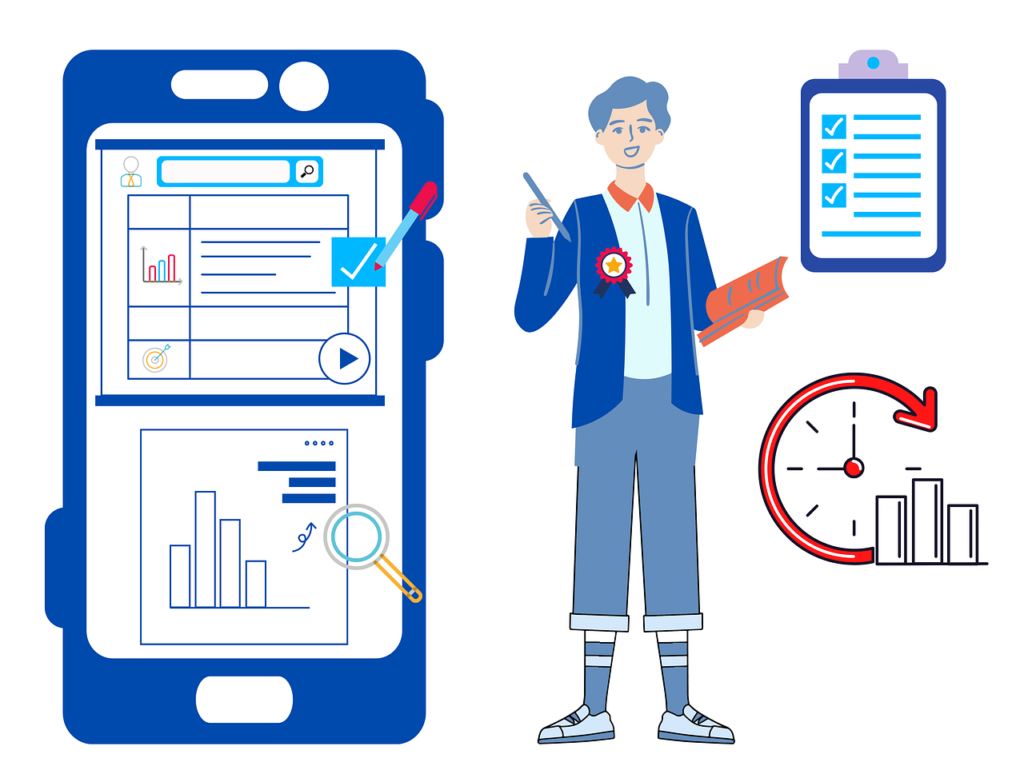In today’s fast-paced and technology-driven world, businesses must adapt to survive and thrive. One of the most significant changes in the business landscape is the shift from traditional marketing methods to digital marketing. But what exactly is digital marketing, and how can it help your business grow? In this article, we’ll explore the various aspects of digital marketing and how they can contribute to the growth and success of your business.
Understanding Digital Marketing
What is Digital Marketing?
Digital marketing refers to the use of online platforms, tools, and strategies to promote products or services. Unlike traditional marketing, which relies on print media, billboards, and TV ads, digital marketing leverages the internet and electronic devices to reach a broader and more targeted audience. From search engines to social media, digital marketing encompasses a wide range of tactics designed to increase visibility and drive sales.
The Evolution of Marketing in the Digital Age
The rise of the internet has fundamentally changed how businesses market themselves. Traditional marketing methods, while still relevant, have taken a back seat to digital marketing strategies. Consumers now spend a significant amount of time online, making digital marketing a crucial component of any successful business strategy. The ability to target specific audiences, measure results in real-time, and adjust strategies on the fly has made digital marketing an indispensable tool for businesses of all sizes.
Key Components of Digital Marketing
Search Engine Optimization (SEO)
SEO is the practice of optimizing your website to rank higher in search engine results pages (SERPs). By using the right keywords, improving site speed, and creating high-quality content, businesses can attract organic traffic and increase their online visibility.
Content Marketing
Content marketing involves creating and distributing valuable content to attract and engage a target audience. Whether it’s blog posts, videos, infographics, or podcasts, content marketing helps build trust and authority in your industry.
Social Media Marketing
Social media marketing uses platforms like Facebook, Instagram, Twitter, and LinkedIn to promote products and services. It’s an excellent way to engage with customers, build a community, and increase brand awareness.
Email Marketing
Email marketing is a highly effective way to nurture leads and convert them into customers. By sending personalized emails to your audience, you can build relationships, share updates, and drive sales.
Pay-Per-Click (PPC) Advertising
PPC advertising allows businesses to place ads on search engines and other platforms and only pay when someone clicks on the ad. It’s a cost-effective way to drive immediate traffic to your website.
Affiliate Marketing
Affiliate marketing involves partnering with other businesses or individuals who promote your products or services in exchange for a commission. It’s a performance-based strategy that can help expand your reach.
Influencer Marketing
Influencer marketing leverages the power of influencers—individuals with a large online following—to promote your products or services. This strategy can significantly increase brand awareness and credibility.
People Also Ask Query Answer in this article
- how digital marketing helps to grow your business
- how digital marketing agency helps to grow your business
- how to grow digital marketing business
- how to grow your business through digital marketing
- how to grow your business with digital marketing
- boost your business with digital marketing
- how to promote your business through digital marketing
- how to use digital marketing to promote your business
- how to use digital marketing for your business
- how can digital marketing help your business
- how does digital marketing help a business
- how does digital marketing affect businesses
- why is digital marketing important for businesses
- why is internet marketing important for businesses
- how digital marketing helps in business growth
- how digital marketing helps small business
- why digital marketing is important for small business

how to promote your business through digital marketing
The Benefits of Digital Marketing for Business Growth
Increased Online Visibility
Digital marketing helps your business stand out in a crowded marketplace. By optimizing your online presence, you can reach more potential customers and increase brand awareness.
Cost-Effective Marketing Solutions
Compared to traditional marketing, digital marketing is more affordable and offers a higher return on investment (ROI). Small businesses, in particular, can benefit from the cost savings that digital marketing provides.
Targeted Audience Reach
One of the most significant advantages of digital marketing is the ability to target specific audiences. Whether you’re using SEO, social media, or PPC, you can tailor your marketing efforts to reach the right people at the right time.
Improved Customer Engagement
Digital marketing allows businesses to interact with their customers in real-time. Whether through social media, email, or live chat, engaging with customers can help build loyalty and increase sales.
Higher Conversion Rates
By targeting the right audience with the right message, digital marketing can lead to higher conversion rates. Whether it’s through a well-designed website, a compelling email campaign, or a targeted ad, digital marketing drives results.
Enhanced Brand Reputation
A strong online presence can significantly enhance your brand’s reputation. By consistently providing value through content, engaging with customers, and addressing their needs, you can build trust and credibility.
How Digital Marketing Drives Traffic and Sales
Digital marketing has become a cornerstone for businesses of all sizes, offering an array of strategies to attract, engage, and convert customers. From search engine optimization to social media, each aspect of digital marketing plays a crucial role in driving traffic and sales.
Utilizing SEO to Attract Organic Traffic
Search Engine Optimization (SEO) is a fundamental tool for attracting organic traffic. By optimizing your website’s content and structure for search engines, you can improve your visibility in search engine results pages (SERPs). This makes it easier for potential customers to find your business when they search for relevant keywords. SEO involves keyword research, on-page optimization, technical SEO, and building quality backlinks to enhance your website’s authority.
The Role of Content Marketing in Educating and Engaging Customers
Content marketing focuses on creating valuable, relevant content that resonates with your target audience. This can include blog posts, videos, infographics, and whitepapers that educate, inform, or entertain. By addressing the needs and pain points of your audience, content marketing not only drives traffic but also builds trust and authority. Consistent content creation helps keep your brand top-of-mind and encourages engagement, ultimately leading to conversions.
Leveraging Social Media to Build a Community
Social media platforms provide a unique opportunity to build a community around your brand. By engaging with your audience through regular posts, stories, and interactions, you can foster relationships and create brand advocates. Social media marketing is also an excellent way to share content, run promotions, and gather feedback from your audience. Platforms like Facebook, Instagram, LinkedIn, and Twitter allow businesses to reach a broad audience and target specific demographics through paid advertising.
Email Marketing: Building Relationships and Driving Sales
Email marketing remains one of the most effective channels for nurturing leads and driving sales. By building a subscriber list, you can send personalized content directly to your audience’s inbox. This could include newsletters, promotional offers, product recommendations, and more. Email marketing is particularly powerful because it allows for segmentation and automation, ensuring that the right message reaches the right person at the right time.
Effective PPC Campaigns for Immediate Results
Pay-Per-Click (PPC) advertising provides an immediate way to drive traffic and generate leads. Unlike SEO, which takes time to yield results, PPC campaigns can start driving traffic to your site as soon as they are launched. By bidding on relevant keywords, your ads can appear at the top of search results or across various websites through display advertising. PPC campaigns are highly measurable, allowing you to track ROI and adjust your strategy based on performance.
Case Studies: Success Stories of Businesses Growing Through Digital Marketing
Small Businesses Thriving Online
Small businesses have leveraged digital marketing to compete with larger competitors by focusing on niche markets, using SEO to target local customers, and building loyal communities through social media and email marketing.
How Large Enterprises Leverage Digital Marketing
Large enterprises use digital marketing at scale, employing advanced analytics, AI-driven personalization, and multi-channel campaigns to reach a global audience. They often invest heavily in content marketing, PPC, and social media to maintain their market dominance.
Challenges in Digital Marketing
The Competition in the Digital Space
The digital landscape is highly competitive, with countless businesses vying for the same audience’s attention. Standing out requires a unique value proposition, consistent branding, and a deep understanding of your target market.
Keeping Up with Technology and Trends
Digital marketing is constantly evolving, with new technologies and trends emerging regularly. Staying up-to-date is crucial for maintaining a competitive edge. This includes adopting new tools like AI, optimizing for voice search, and understanding changes in consumer behavior.
Measuring ROI Effectively
One of the biggest challenges in digital marketing is accurately measuring ROI. With multiple channels and touchpoints, attributing conversions to specific efforts can be complex. However, tools like Google Analytics, CRM systems, and marketing automation platforms can help track and analyze performance.

how digital marketing helps in business growth
Tips for Implementing a Successful Digital Marketing Strategy
Understanding Your Target Audience
Knowing your audience is the foundation of any successful digital marketing strategy. Conduct market research to understand their demographics, preferences, and pain points. This will inform your content, messaging, and channel selection.
Setting Clear Goals and KPIs
Define clear goals and key performance indicators (KPIs) for your digital marketing efforts. Whether it’s increasing website traffic, generating leads, or boosting sales, having specific objectives will guide your strategy and help measure success.
Choosing the Right Marketing Channels
Select the marketing channels that align with your audience and goals. This might include SEO, PPC, social media, content marketing, email marketing, or a combination of these. Each channel has its strengths and should be chosen based on your objectives and resources.
Consistent Content Creation and Distribution
Consistency is key in digital marketing. Regularly create and distribute content that provides value to your audience. A content calendar can help ensure that your messaging remains consistent across all channels.
Analyzing and Adjusting Your Strategy
Digital marketing requires ongoing analysis and optimization. Use analytics tools to track performance, identify trends, and make data-driven decisions. Be prepared to adjust your strategy based on what’s working and what’s not.
The Future of Digital Marketing
Emerging Trends to Watch
The future of digital marketing will be shaped by trends such as the rise of short-form video content, the growing importance of influencer marketing, and the increased use of AI and automation in campaign management.
The Role of AI and Machine Learning in Digital Marketing
AI and machine learning are revolutionizing digital marketing by enabling more personalized and efficient campaigns. From chatbots that improve customer service to algorithms that predict consumer behavior, these technologies are enhancing how businesses engage with their audience.
Conclusion
Digital marketing is an essential component of modern business growth. By understanding and effectively utilizing its various elements—SEO, content marketing, social media, email marketing, and PPC—businesses can drive traffic, generate leads, and increase sales. As technology continues to evolve, staying ahead of trends and continuously refining your strategy will be key to long-term success.
FAQs
What is the most important aspect of digital marketing?
Understanding your target audience is the most crucial aspect, as it informs every other element of your strategy.
How long does it take to see results from digital marketing?
Results can vary depending on the strategy. SEO might take several months to show significant results, while PPC campaigns can drive traffic immediately.
Can small businesses benefit from digital marketing?
Absolutely. Small businesses can use digital marketing to reach their target audience, build brand awareness, and compete with larger companies.
What is the role of SEO in digital marketing?
SEO is vital for attracting organic traffic by improving your website’s visibility in search engine results, leading to increased brand awareness and potential sales.
How do I measure the success of my digital marketing efforts?
Success can be measured through various KPIs, such as website traffic, conversion rates, email open rates, and ROI. Analytics tools are essential for tracking and analyzing these metrics.
